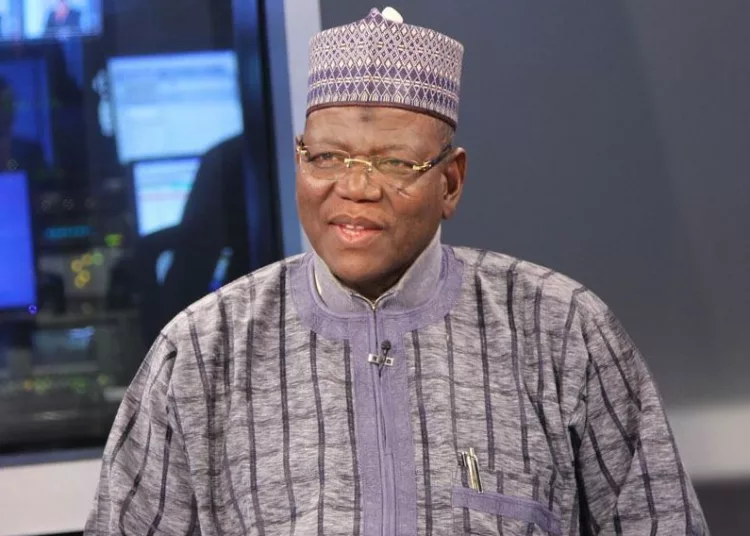The Presidency has lashed out at former Governor of Jigawa State, Alhaji Sule Lamido, over comments made during a recent live television appearance in which he accused President Bola Tinubu of supporting the annulment of the historic June 12, 1993 presidential election.
In a strongly worded statement released on Sunday, the Special Adviser to the President on Information and Strategy, Bayo Onanuga, described Lamido’s claims as “false, revisionist and a distortion of historical facts,” warning that such deliberate misinformation undermines the truth about Nigeria’s democratic struggle.
Lamido had claimed on television that President Tinubu only gained prominence after the formation of the National Democratic Coalition (NADECO) and that his mother, Alhaja Abibatu Mogaji, mobilised market women to support the annulment of the election, which was won by the late Chief MKO Abiola under the platform of the defunct Social Democratic Party (SDP).
“These allegations are patently false,” Onanuga said. “Alhaja Mogaji never mobilised anyone in support of the annulment. Had she done so, she would have lost her position as the market leader in Lagos. Her previous relationship with President Babangida was long before the annulment saga.”
According to the Presidency, it was ironic that Lamido, who served as National Secretary of the SDP at the time, could accuse Tinubu—who took bold and visible steps in opposition to the military junta—of complicity.
Onanuga reminded Nigerians that Lamido and the then SDP chairman, the late Chief Tony Anenih, failed to resist the military’s actions and ultimately “wrote their names in the book of infamy” by aligning with the defeated National Republican Convention (NRC) to deny Abiola his mandate.
“In contrast, Senator Bola Tinubu, then representing Lagos West in the Senate, stood firm and fearless even before General Sani Abacha dissolved all democratic institutions,” the statement said.
The Presidency cited Tinubu’s August 19, 1993, speech on the Senate floor, where he forcefully condemned the annulment of the June 12 election. Tinubu had described the cancellation as “another coup d’état” and accused the military of violating its own decrees.
“We have a situation that suggests that the abortion of the June 12 election is another coup d’etat,” Tinubu was quoted as saying. “The present military administration, by virtue of abrogation and violation of its own decree, has committed a crime.”
Tinubu’s support for Abiola, the Presidency recalled, remained unwavering even after the military, under Abacha, dismantled democratic institutions and arrested pro-democracy legislators.
He added that Tinubu, along with Senators Ameh Ebute, Abu Ibrahim and others, continued to resist the junta. They were arrested, detained at Alagbon, and later prosecuted under trumped-up charges. Despite being behind bars, Tinubu continued to fund pro-June 12 protests in Lagos, including the blockade of the Third Mainland Bridge.
The presidency detailed how Tinubu later joined NADECO following Abiola’s arrest in June 1994 after his declaration of himself as president. Tinubu fled into exile, narrowly escaping a deadly bomb attack on his residence in Victoria Island, Lagos. While abroad, he not only lent moral support but also provided critical financial assistance to sustain the pro-democracy movement, including supporting Professor Wole Soyinka’s NALICON.
“Tinubu lived in exile for nearly five years while Lamido and his ilk were making deals with the Abacha regime,” Onanuga stated.
The Presidency noted that while Lamido grudgingly admitted Tinubu’s involvement in NADECO, he still attempted to downplay its significance. “Lamido appeared confused about NADECO’s role. NADECO was the natural response to the June 12 crisis and became the unifying platform for the resistance,” the statement read.
Accusing Lamido of deliberately rewriting history for political reasons, the Presidency described him as part of a “Coalition of the Disgruntled” and warned that such revisionism does not serve the interest of truth or national unity.
“We do not want to believe that Alhaji Lamido suffers from what psychologists call tall poppy syndrome. However, the conclusion is inevitable as it appears that Lamido is envious of Tinubu’s democratic credentials,” Onanuga remarked.
“The facts remain clear: President Tinubu was—and remains—a steadfast advocate for democracy, in contrast to the record of Lamido and others who capitulated in the face of military oppression and intimidation,” he added.
Onanuga urged Lamido to check his facts before going public, stressing that history, as recorded by those who paid the price for Nigeria’s democracy, cannot be revised for political gain.
We’ve got the edge. Get real-time reports, breaking scoops, and exclusive angles delivered straight to your phone. Don’t settle for stale news. Join LEADERSHIP NEWS on WhatsApp for 24/7 updates →
Join Our WhatsApp Channel










